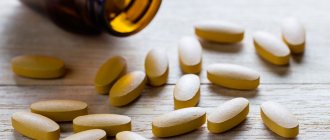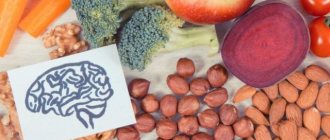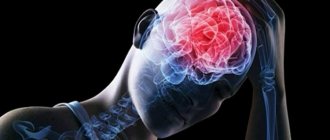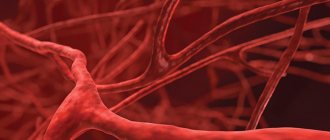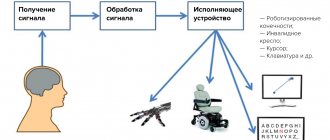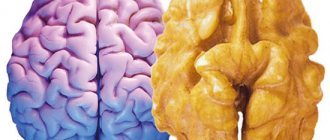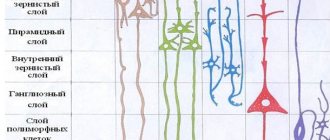With age or as a result of certain events in a person's life, a decline in mental abilities can be observed. People cannot concentrate on the task at hand, they forget basic things, they begin to “think slowly”, and get tired of the slightest intellectual activity. This happens for many reasons, but if we ignore mental disorders, we can identify several common reasons: age-related changes, overwork and stress, poor diet, lack of vitamins.
Like the entire body, the brain depends primarily on the functioning of blood vessels. If their functioning is disrupted, mental activity begins to decline, headaches appear, and it is difficult to remember recently received information. The vascular system is negatively affected by age, diabetes, osteochondrosis, and lack of microelements responsible for the stable functioning of blood vessels. In the latter case, properly selected vitamin complexes will provide indispensable support.
Essential organic compounds include B vitamins:
- IN 1.
Its deficiency provokes memory impairment, depression, anxiety, and lack of coordination. - AT 2
. With a deficiency, drowsiness, headaches, a feeling of weakness, and “fog” in the head are observed. - AT 3.
Improves memory, increases concentration. - AT 5.
Has a beneficial effect on long-term memory and normalizes sleep. - AT 6.
Stimulates intellectual activity, has proven itself well as a remedy that has a positive effect on alcohol poisoning and frequent nicotine consumption. - AT 9.
“Accelerates” thinking. - AT 12.
Maintains brain activity at the proper level, helps adapt to changing situations and changes in activity.
In addition, for proper brain function, the following vitamins are required:
- A.
A necessary component for the functioning of the vascular system. - D.
Responsible for preventing atherosclerosis. - E.
Cleanses blood vessels from toxins. - R.
Makes capillaries stronger, reduces the risk of hemorrhage.
Many dietary supplements are made based on natural ingredients - herbs and fruits. Common ones include:
- Dog-rose fruit.
- Ginkgo biloba.
- Rosemary.
- Sage.
- Ginseng, Eleutherococcus.
- Green tea.
Below are collected pharmaceutical products designed to improve the performance of the brain and the condition of the body as a whole.
We present the rating of vitamins for the brain and memory 2021. The best 11 products that were selected by our experts based on user reviews and ratings.
There are contraindications, be sure to consult your doctor!
| Rating (2019) | Prices, ₽ | A country |
| 1. Solgar Neuro-Nutrients | from 950₽ | USA |
| 2.Orthomol Mental | from 5000₽ | Germany |
| 3. Doppelhertz Active Ginkgo Buloba + B1 + B2 + B6 | from 400₽ | Germany |
| 4. Now Foods Brain Elevate | from 1400₽ | USA |
| 5. Vitrum Memory | from 900₽ | USA |
| 6. Vita-Ra Microbiome Brain | from 1600₽ | Russia |
| 7. Memoplant | from 700₽ | Germany |
| 8. Gerimaks Energy | from 400₽ | Denmark, France |
| 9. Ostrum Evalar | from 250₽ | Russia |
| 10. Memo-Vit | from 350₽ | Russia |
| 11. Glycine | from 50₽ | Russia |
B vitamins
Let's look at the unique roles of the seven vitamins:
B1 (thiamine)
Plays an important role in metabolism, helping to convert nutrients into energy, normalizes the condition of the cardiovascular and endocrine systems. Necessary for the protection of nerve cell membranes, transmission of nerve impulses and nutrition of the brain.
The richest food sources include pork, sunflower seeds and wheat germ.
B2 (riboflavin)
Helps convert food into energy and also acts as an antioxidant. Increases the level of hemoglobin in the blood, stimulates hematopoiesis. Improves the general condition of the nervous system.
Foods highest in riboflavin include organ meats, beef and mushrooms.
B3 (niacin, vitamin PP)
Plays a role in transmitting signals from cell to cell, normalizes inhibitory processes in the central nervous system, prevents the occurrence of neuroses and hysteria. Participates in metabolism, production and repair of DNA. It is also critically important for metabolic processes in the heart muscle, good blood circulation and normal blood clotting.
Food sources: chicken, tuna, lentils.
B5 (pantothenic acid)
Like other B vitamins, pantothenic acid helps the body obtain energy from food, and is also involved in the production of hormones, cholesterol and tissue regeneration. In the nervous system it is responsible for “feelings”, as it plays a role in the synthesis of acetylcholine, the most important substance for the transmission of nerve impulses in the central nervous system to the parasympathetic nervous system.
Liver, fish, yogurt and avocados are rich in pantothenic acid, but cooking them significantly reduces the dose.
B6 (pyridoxine)
Participates in the metabolism of amino acids, the production of red blood cells, and has a beneficial effect on the condition of blood vessels. In the nervous system, it plays a role in the creation of neurotransmitters (substances through which electrical impulses are transmitted in nerve cells). It is also responsible for the uptake of glucose by neurons and the absorption of magnesium, which ensures the transmission of nerve impulses. Pyridoxine also helps improve memory and mood, as it participates in the synthesis of serotonin.
Foods with the highest content: chickpeas, salmon and potatoes.
B9 (folic acid)
Necessary for cell growth and proper division, amino acid metabolism, formation of red and white blood cells, and prevention of anemia. In the nervous system, it is responsible for the synthesis of glycine, which has anti-stress and nootropic effects and regulates inhibition processes.
Can be obtained from leafy greens, liver and legumes.
B12 (cobalamin)
Perhaps the best known of all the B vitamins, it is vital for neurological function. Affects the formation of the sheath of nerve fibers (myelin), which protects nerve cells from destruction and strengthens the nervous system. Involved in the production of DNA and red blood cells. Improves muscle function, including the heart.
Contained in foods of animal origin: meat, eggs, seafood and dairy products.
To accept or not to accept?
Nootropics have been gaining popularity lately. But today there is still no clear opinion about the effectiveness of this group of funds. According to available information. Based on available information, these drugs can be judged to improve cognitive abilities. However, nootropics should not be perceived as magic pills that help you become smarter and more capable. Their role is to improve brain activity and increase resistance to psycho-emotional stress. In order not to make a mistake with your choice and notice the effect of nootropics, you should consult with a specialist.
Features of taking vitamins for memory
The intake of useful substances into the children's body, which in one way or another help improve brain function, is necessary from a very early age. Immediately after birth, the baby receives everything he needs through mother's milk, and subsequently it is important to accustom him to a varied diet that can meet the needs of a growing body.
Unfortunately, the diet of most children is far from ideal. And not even because it is oversaturated with such useless products as sweets, chips or sweet soda, but rather because children are reluctant to eat fish, many types of meat, and vegetables. Children do not receive enough vitamins to improve memory from food, therefore, they must be taken additionally.
When choosing a suitable vitamin-mineral complex, it is best to use the pediatrician’s recommendations; in addition, it is important to pay attention to the components included in the drug. Unfortunately, not all manufacturers take into account the needs of the child’s body at every stage of its growth. Other disadvantages of some vitamin supplements include exceeding the WHO recommended daily allowances and the wrong combination of ingredients.
What are the dangers of an overdose of certain vitamins, and what organic compounds are best combined with each other?
Vitamin B1
Thiamine levels may decrease when taking antibiotics and antacids. With a single dose of an excessive dose, severe signs of allergy are observed, and long-term overdose threatens to impair the functions of the kidneys and liver.
It is well absorbed by the body and does not antagonize with other components of vitamin-mineral complexes.
Vitamin B6
Symptoms of overdose are depression, muscle weakness, pain in the fingers and toes.
It interacts best with vitamin B3, as well as calcium and copper.
Vitamin E
Long-term use of high doses leads to blood clotting disorders, provokes gastrointestinal disorders, and headaches.
Improves the absorption of vitamin C, and when taken simultaneously with vitamin K, it can provoke pathological bleeding due to its ability to thin the blood.
Selenium
Too high doses have a toxic effect on the body, leading to gastrointestinal disorders, disorders of the nervous system, irritability, and fatigue. There may be a garlic odor from the breath, brittle nails and hair, and a skin rash.
Selenium is best absorbed with vitamin E.
Zinc
Long-term consumption of excess amounts of zinc provokes suppression of the immune system and contributes to copper deficiency. A one-time intake of an excessive dose may cause nausea and vomiting.
Absorbed best with sufficient magnesium levels.
Iodine
In acute iodine poisoning, there is an acute burning sensation in the digestive tract, diarrhea, nausea, vomiting, and fever. The pulse weakens, consciousness becomes confused. Constant consumption of high doses of iodine leads to the development of diseases such as goiter, thyrotoxicosis, and thyroiditis.
Iron
A deficiency of this microelement is diagnosed quite often, despite the widespread availability of iron and its fairly easy absorption by the body. An overdose can lead to gastrointestinal disorders, as well as dysfunction of the cardiovascular and nervous systems, liver, and kidneys. Taking iron supplements must always be agreed with your doctor because of the fairly large list of contraindications.
Iron interacts best with vitamins B6 and C.
Vitamin B12
It is absorbed by the body in the required quantity, so cases of overdose are rare. However, sometimes when the dose is significantly exceeded, numbness and a feeling of tightness in the limbs may be observed.
It is best absorbed with other B vitamins, especially B5 and B9.
Natural medicines
Preparations based on medicinal plants activate the brain and help improve memory. They are recommended for elderly people and people who often suffer from mental stress. The products have a cumulative effect, the therapeutic effect will be noticeable in at least a month.
Advertising:
List of effective medications:
- Divaza
. The drug contains specific antibodies that help improve the functioning of the nervous system. The medicine corrects brain functions, relieves depression, helps with insomnia and poor concentration. Dosage - 3-6 tablets per day. Course duration is 4-6 months. - Bilobil Forte
. One of the best drugs for eliminating the manifestations of senile dementia and restoring brain function. The medicine eliminates forgetfulness, tinnitus, and dizziness. Take 1 tablet 2-3 times a day for 3 months. - Tankan
. An effective cerebral circulation regenerator. The medicine improves the supply of tissues with oxygen and glucose and activates metabolic processes. Take 1 tablet or 1 ml of solution three times a day with meals. The minimum course of treatment is 3 months.
All these drugs can be purchased without a prescription; before starting treatment, you should carefully study the instructions. Medicines should not be taken simultaneously with alcoholic beverages. The last dose should be a few hours before bedtime.
Popular questions from parents about children's vitamins
Questions about vitamins that parents ask especially often:
At what age should a child be given vitamins?
Vitamins in the form of drops can be given to a baby from the first days of life as prescribed by a doctor.
Is the natural composition of vitamins important?
It is desirable that the composition of the chosen product be as natural as possible. In the middle price category, semi-synthetic vitamins predominate - they are well absorbed and rarely provoke allergies. The body absorbs completely natural vitamins perfectly, but such preparations are expensive and difficult to find on sale. Fully synthetic drugs have a low price, but they are absorbed by the body for a long time.
Does my child need to take vitamin and mineral complexes on a regular basis?
No, it is enough to take vitamins in a course according to the instructions for the drug, no more than two courses a year. It is best to take vitamins during the off-season periods: spring and autumn.
What vitamins are especially important for a child's development?
Most often, children have a deficiency of vitamins C and group B - it is desirable that these vitamins be part of the chosen product. Vitamins A, D, E can be obtained in sufficient quantities by simply adjusting the child’s diet.
What is in the assortment of “Fitomaket Evalar”
Our store has a large selection of vitamins to improve memory and brain function. Pay attention to products from:
- "Ginkgo biloba",
- "Glycine Forte"
- vitamin complex "Ostrum"
- chocolate drink "Ostrum" for a sharp mind and good memory.
Is it possible for schoolchildren 12, 13, 14 years old to take such vitamins for brain activity if there is no age mark on the packages? Yes, and this is confirmed by methodological recommendations MP 2.3.1.2432-08 “Norms of physiological needs for energy and nutrients for various groups of the population of the Russian Federation,” approved by Rospotrebnadzor. According to this document, daily doses of the ingredients in question for children over 11 years of age are no less than doses for adults. For children, vitamins are often produced in a special form of chewable lozenges.
Goldfish for Children, 90 Chewable Tablets, Solgar
2 199 ₽
Dietary supplement NOT A MEDICINE
Essential Vitamins and Minerals for Children's Brains
| Vitamin/mineral | Function | Sources in products | Signs of Deficiency |
| B1 (thiamine) | Stimulates cognitive activity, promotes better memory, optimizes brain function. | Peas, buckwheat and oatmeal, nuts, pork, wholemeal bread. | Irritability, tearfulness, insomnia, increased fatigue, decreased appetite, deterioration of memory and attention. |
| B6 (pyrodoxine) | Participates in the formation of neurotransmitters necessary for the normal functioning of the brain, affecting mood, emotional stability, and concentration. | Fish, chicken, beans, whole grains, nuts, grains. | Skin rash, depression, confusion. |
| E | Powerful antioxidant – binds free radicals, preventing damage they can cause to brain neurons. | Vegetable oils, especially corn, sunflower, whole grains, seeds, nuts. | Sometimes there may be a lack of coordination of movements and muscle weakness. |
| Selenium (Se) | An immunomodulator, an antioxidant that protects brain cells and promotes their better functioning. | Seafood, cereals, meat, grain products. | Decreased immunity, susceptibility to colds, dysfunction of the thyroid gland. |
| Zinc ( Zn) | Necessary for normal brain development and the functioning of its cells. | Beef, dark chicken and turkey meat, crabs, crayfish, oysters, whole grains. . | Stunted growth, susceptibility to infections, poor wound healing, absent-mindedness. |
| Iodine (I) | Improves brain function, promotes intelligence development. | Seaweed, seafood. | Thyroid dysfunction, mental retardation, decreased concentration. |
| Iron (Fe) | Increases hemoglobin content in the blood, helps saturate the brain with oxygen. | Green vegetables, beef liver, egg yolk, apples, dried fruits. | Weakness, decreased mental abilities, developmental delay. |
| B12 ( cyanocobalamin ) | Ensures normal functioning of the nervous system and improves memory. | Meat, fish, eggs, dairy products, poultry. | Fatigue, increased nervousness, impaired cognitive abilities. |
Content:
- Children's vitamins: what are they and does your child need them?
- Vitamins for children: features of choice
- The best vitamins for children: rating For babies under one year old
- For 1-3 years
- For preschoolers over 3 years old
- For younger students
- For teenagers
- At what age should a child be given vitamins?
Should I take extra vitamins?
Unfortunately, providing a child with nutrition that would fully provide his body with the necessary vitamins and minerals is very difficult. There are several reasons for this:
- children's whims, refusal of unloved, although healthy food;
- unavailability of certain food products;
- insufficient saturation of foods with vitamins due to cultivation in artificial conditions.
That is why most children need additional intake of specially designed vitamin complexes. And at the age of 6-8 years, when a child begins school life with increased stress, the relevance of children's vitamins for the mind increases many times over.
IMPORTANT! Despite the obvious benefits that vitamins bring to the body, their use is not always good. A competent specialist who will assess the need depending on:
- the health and condition of the child, the presence of chronic diseases;
- region of residence;
- mental and physical stress.
In addition, you need to know which vitamins and minerals combine with each other, enhance each other’s effects, and which ones, on the contrary, reduce absorption.
On the recommendation of a pediatrician, children can take vitamins for the mind at any age by choosing the appropriate form and dosage of the drug. For children under one year old, drops that are added directly to food are best suited; from one to four years old, syrups are an excellent choice, and older children can already be given chewable or effervescent tablets.
The benefits and harms of nootropics
The benefit of nootropic drugs is to improve cerebral blood supply. But with such undeniable effectiveness, these products still cannot be considered completely safe. Nootropic drugs should not be taken without a doctor’s prescription, since drugs in this group have a number of contraindications, including:
- hypersensitivity to components;
- presence of chronic diseases;
- pregnancy and lactation;
- Many nootropics are contraindicated for epilepsy.
Nootropic therapy, when carefully following the doctor’s recommendations, has a good effect on the body. However, if the dosage or regimen is violated, or if the wrong drug is chosen, side effects of nootropics may occur, which not only worsen existing symptoms, but also provoke new disorders:
- allergic reactions;
- headache;
- excitement and excessive nervousness;
- dyspepsia (stomach dysfunction).
